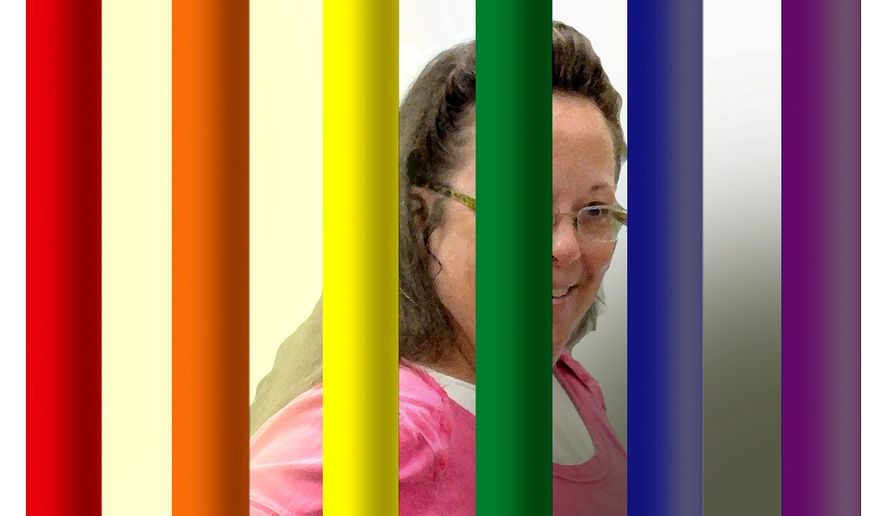OPINION:
If you have that sinking feeling that we’re living in a period of lawlessness, you’re not alone. Something is very out of whack in America.
In Kentucky, Rowan County Clerk Kim Davis was led off to jail on Thursday for disobeying a federal judge’s order to issue marriage licenses to couples that lack a bride or a groom. Kentucky’s marriage law, part of the state Constitution that was put on the books by 75 percent of the voters in 2004, requires one of each sex.
Ms. Davis has been roundly denounced as lawless, but as a devout Christian, she regards the Supreme Court’s June opinion legalizing same-sex “marriage” as itself immoral, lawless and unsupported legally.
She’s also gotten death threats, and her left-wing critics are digging up accounts of her own marital difficulties — before she became a Christian.
Ms. Davis is apparently the first Christian to be arrested over the Supreme Court’s ruling. Others, such as bakery owners and florists, have been fined for not surrendering their consciences and servicing what they regard as celebrations of sin.
It’s anyone’s guess how Ms. Davis’ case will turn out, but her stance raises a very important question:
Is she the one acting lawlessly, or is it the people who are trying to force her to violate her conscience who are lawless?
Sitting in the Birmingham jail, Martin Luther King Jr. wrote that critics found his activism, which included civil disobedience, “unwise and untimely.”
He responded, “One may well ask, ’How can you advocate breaking some laws and obeying others?’ The answer is found in the fact that there are two types of laws: There are just laws, and there are unjust laws. I would agree with St. Augustine that ’An unjust law is no law at all’ .
“An unjust law is a code that is out of harmony with the moral law. To put it in the terms of St. Thomas Aquinas, an unjust law is a human law that is not rooted in eternal and natural law.”
Similarly, William Blackstone, the great English jurist and contemporary of America’s Founders, wrote that English Common Law and its emphasis on human rights was based on the higher law of God and found in the Scriptures. As Alliance Defending Freedom’s Blackstone Fellowship landing page notes: “Because of this, man lacks authority to write a law that contradicts God’s law. In fact, this was the basic premise of the Declaration of Independence. Blackstone called this concept ’ultra vires,’ which means it is beyond the authority of man to write a law that violates God’s law.”
Which brings us to Ms. Davis. She could have just resigned, or given in and issued marriage licenses to couples lacking a bride or a groom. But she chose to follow Kentucky law, as well as that of a far higher power.
On Sept. 1, Liberty Counsel, which is representing Ms. Davis, released a statement from her. Here’s an excerpt:
“I never imagined a day like this would come, where I would be asked to violate a central teaching of Scripture and of Jesus Himself regarding marriage. To issue a marriage license which conflicts with God’s definition of marriage, with my name affixed to the certificate, would violate my conscience. I have no animosity toward anyone and harbor no ill will. To me this has never been a gay or lesbian issue. It is about marriage and God’s Word. It is a matter of religious liberty, which is protected under the First Amendment, the Kentucky Constitution, and in the Kentucky Religious Freedom Restoration Act.”
Ms. Davis is a canary in the coal mine, whose plight shows clearly how the legalization of same-sex marriage will lead directly to crises of conscience for Christians and others who thought they lived in a country whose Constitution explicitly protects religious liberty.
• Robert Knight is a senior fellow for the American Civil Rights Union and a Washington Times contributor.




Please read our comment policy before commenting.